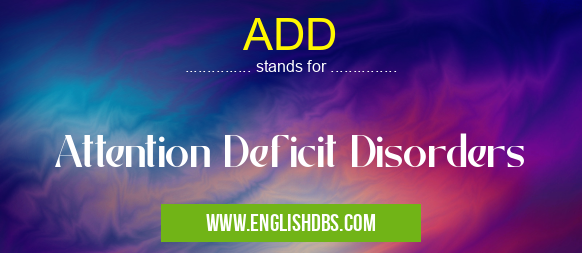What does ADD mean in PEDIATRIC
Attention Deficit Disorder (ADD) is a mental health condition characterized by difficulty focusing and concentrating on tasks, impulsivity, and hyperactivity. ADD can have an impact on emotional regulation, behavior, and social functioning.

ADD meaning in Pediatric in Medical
ADD mostly used in an acronym Pediatric in Category Medical that means Attention Deficit Disorders
Shorthand: ADD,
Full Form: Attention Deficit Disorders
For more information of "Attention Deficit Disorders", see the section below.
Essential Questions and Answers on Attention Deficit Disorders in "MEDICAL»PEDIATRIC"
What are the signs of Attention Deficit Disorder?
Common symptoms of Attention Deficit Disorder include difficulty focusing and concentrating on tasks, impulsivity, poor time management and organization skills, difficulty with emotional regulation, chronic forgetfulness, disorganization, restlessness or impulsive behavior.
Is Attention Deficit Disorder treatable?
Yes! Treatment for Attention Deficit Disorder generally includes lifestyle changes such as getting regular exercise and sleep, managing stress levels effectively, as well as utilizing strategies to improve focus. In addition to lifestyle changes, medication may be prescribed to help manage symptoms.
How can I help my child with Attention Deficit Disorder?
There are many ways to provide support to a child who has been diagnosed with ADD. Building structure into their daily routine can help them stay organized while also providing positive reinforcement when they successfully complete a task. Parents should also create an environment that is sensory friendly; this could mean having certain items available in order to help their child stay calm or focused. Additionally, it's important for parents to model healthy behaviors for their children as well as set realistic expectations for them in terms of what they can accomplish each day.
How does Attention Deficit Disorder affect adults?
Adults with ADD may experience difficulty following through on tasks and goals due to impulsiveness or forgetfulness; symptoms such as chronic disorganization or procrastination may arise from the inability to focus on specific tasks for extended periods of time. Additionally, adults with ADD may experience difficulty managing emotions or have interpersonal challenges due to the impulsivity associated with the disorder.
Are there any long-term complications associated with Attention Deficit Disorder?
If left untreated over time Attention Deficit Disorder can become more severe and result in long-term negative outcomes such as issues at work/school or financial difficulties due legal trouble stemming from impulsive behavior or risk taking activities. It's important that adults who suspect they may have ADD seek treatment in order to prevent further complications down the line.
Final Words:
People living with Attention Deficit Disorder (ADD) often require professional treatment in order to effectively manage their symptoms. In addition to medical treatments such as medications and lifestyle modifications like exercise and sleeping patterns; providing emotional support and appropriate structure are essential components of helping individuals manage behavioural challenges associated with ADD over time.
ADD also stands for: |
|
| All stands for ADD |
